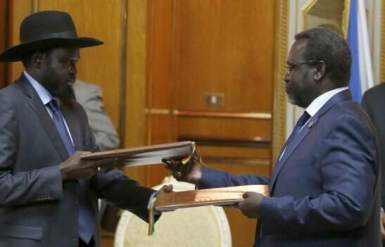Former Nigerian leader calls on S. Sudanese rivals to end the bloodshed
July 24, 2014 (JUBA) – Former Nigerian president Olusegun Obasanjo insists South Sudanese leaders have the primary responsibility to end the ongoing conflict for the healing and reconciliation processe to take place in the country.

“If we are talking about healing, bleeding must stop. The bleeding should stop so that the process of healing and reconciliation can take place,” he said.
The team, on their third visit to the country, met government officials, including president Salva Kiir, senior cabinet officials, members of the military, police and intelligence services.
Obasanjo, however, said the AU and the international can only facilitate negotiations in the conflict, which South Sudanese leaders were capable of ending.
“The South Sudanese are the architects of their own fortune or if you like, to the large extent, their won misfortune. Let’s be honest with ourselves,” he said.
Part of the continental body’s responsibility, the ex-Nigerian leader stressed, was the investigation being conducted by its commission of inquiry and the proposed deployment of monitoring and verification military force.
“But really, the countries in Africa must be the one that will take the responsibility for preventing conflict, destruction, violence, in their own country,” he said.
The chair of the probe team, however, said the five-member commission of inquiry would leave no stone unturned in South Sudan, stressing that there must be accountability for all killings since the fighting started.
“We will come up with full report. After Juba massacre, you can also talk of Bor massacre, you can also talk of Bentiu massacre, and you can also talk of Malakal massacre. All these impunities must be stopped,” he said.
Meanwhile, the AU commission, during their first visit to the country, met opposition leader, Riek Machar, the 11 former politicians accused of plotting a coup, internally displaced persons living in United Nations bases in South Sudan’s Jonglei, Unity and Upper Nile states.
“This exercise is intended to offer more in-depth attempt at understanding and establishing the facts as it pertains to the events of December 15 and beyond,” party reads its 24 July statement.
The commission, it further said, met the director-general for national intelligence and security who also gave “useful explanations as to the events that unfolded and are still unfolding in the country”.
Also interviewed were UN officials, civil society members, academic, religious leaders, women groups, private sector and the media, AU commission officials said.
“The Commission of Inquiry on South Sudan further intends to commence its investigative work to enable it ascertain or otherwise the facts already obtained in order to come to relevant conclusions for transmission to the Peace and Security Council,” the statement adds.
Both sides will resume peace talks next week, despite fresh fighting over control of a key Upper Nile state town, the Inter-governmental Authority on Development (IGAD) said Thursday.
(ST)
